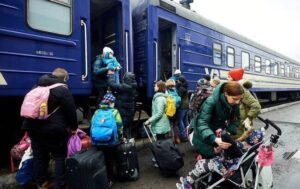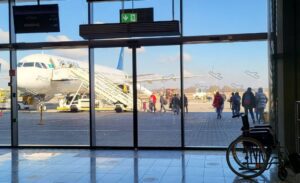
“We can confirm that there is a trend for Ukrainians to return home. We really see all the migration, we see all countries. Today, according to the Kyivstar database, Poland has accepted 35% of Ukrainians who have left the country, Germany – 15%, the Czech Republic – 7%, Italy – 5%, Moldova and Romania – 2% each, that is, these are the list of the top countries where Kyivstar customers went,” Kyivstar President Oleksandr Komarov said in an interview with Interfax-Ukraine.
He also said that according to the operator, there are about 8.7 million internally displaced persons in Ukraine.
“These are two types of migration: from big cities to towns and from east to west. Approximately 4 million people have moved to other areas of the country, others have moved from cities to villages within their regions. The internal migration of such a large number of people is a technical challenge for mobile networks,” Komarov said.
According to him, today the average speed of mobile Internet in the Kyivstar network has fallen from about 38 Mbps to 28 Mbps due to the fact that almost 5 million subscribers have left the cities for the countryside.
“From territories where mobile data transmission is available in the 1800MHz and 2600MHz bands, they went to where LTE-900 technology works, which has a lower capacity. And this is the reason that we are now rethinking our plan to build new base stations for this year. For example, in areas with strong growth in subscribers, we plan to move from LTE-900 to LTE-1800, it is possible to increase it up to 2600 MHz somewhere,” the president of the operator said.
He also said that the operator focuses on the subscriber migration data in terms of network development. In particular, the changes affected plans to build a gigabit network.
If earlier the operator focused in this part mainly on large cities, then during the war, the construction of a gigabit network in Lviv was completed in the first place, and it is also planned to expand other sections of the network in Western Ukraine.
As reported, specialists of the Kyivstar mobile network operator in the two months of the war eliminated more than 48,000 accidents in the physical and digital infrastructure of the network, and also replaced almost 25,000 meters of optical fiber.

The vast majority (79.2%) of refugees from Ukraine intend to return to their homeland after the end of the war, and only 10.9% do not plan to return, according to the results of a survey conducted by the Sociological Service of the Razumkov Center at checkpoints in the Transcarpathian region from March 15 to April 1.
During the survey, 101 respondents over 16 years old were interviewed, who were traveling from Ukraine on foot or by road. 89.1% are sure that Ukraine will win this war, only 1% are sure that it will lose, the rest found it difficult to answer.
83.2% of refugees are women. 63.4% travel with their children and only 12.9% on their own.
36.6% – leaving the country at the age of 30-39, 25.7% – 40-49 years old, 18.8% – 16-29 years old, 10.9% – over 60 years old and 7.9% at the age of 50 -59 years old.
The relative majority of refugees are from Kyiv and Kharkov regions (18.8% each), slightly less from Kiev (11.9%), Donetsk (7.9%), Zaporozhye (6.9%), Mykolaiv, Odessa, Kherson ( by 5%) regions. No one left Volyn, Lvov, Khmelnytsky, Ivano-Frankivsk, Chernivtsi, Ternopil regions. 55.4% stated that they left the settlement where the hostilities took place, 12.9% – that the hostilities took place nearby, 9.9% – that there were no hostilities, but their locality was bombarded or shelled, 13.9 % – that this happened in a neighboring settlement, and only 7.9 noted that there were no hostilities and shooting either in their settlement or nearby.
26.7% reported that they received assistance from government agencies, 53.5% – from volunteers, 8.9% – from religious organizations, 6.9% – from enterprises (including at the place of work), 40, 6% – from relatives and friends, 44.6% – from unfamiliar fellow citizens, only 20.8% received no help at all. 63.4% of refugees said that the language of communication at home is Russian (only 30.7% – Ukrainian), but only 21.8% called Russian their native language (Ukrainian 65.3%, 4% named another language).

As many as 432 citizens of Kazakhstan have been evacuated home from Ukraine on board three planes, and the organization of a fourth flight is underway, the Kazakh Foreign Ministry said on Saturday.
“Three Air Astana flights evacuated 432 people to Kazakhstan as of today. The sending of a fourth evacuation aircraft is being arranged now. The flight will be organized as soon as the necessary number of citizens gather in Katowice, Poland,” it said.
Since the start of the evacuation campaign from Ukraine, Kazakh offices abroad have helped 553 citizens to leave the country, the ministry said.
A number of Kazakhstanis who earlier left Ukraine have decided to stay in the European Union territory, the ministry said.
There were 30 Kazakhstanis in Katowice, and a bus with 30 passengers was about to cross the Ukrainian-Polish border on Saturday. Another nine people were waiting at an evacuation point near Kazakhstan’s honorary consulate in Lviv, ten people in Kyiv, and seven in Kharkiv.